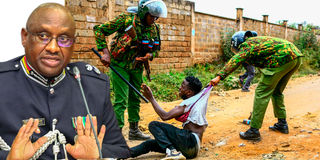Where’s IG Koome amid brutality, meddling claims?

Inspector General of Police Japhet Koome (left). A protestor pleads with the police after being arrested along Joseph Kang'ethe road in Kibra on July 19, 2023.
Some insiders are blaming political interference on the operations of the National Police Service (NPS) for the ‘rising cases of police misconduct’ across the country.
The Nation has learnt that some politicians drop names of top national government officials to issue orders to junior police officers, which has in some instances caught their seniors unaware and unable to protest as they cannot be seen to be contradicting their civilian bosses.
This, according to sources, has resulted in clandestine arrests, prolonged detention of suspects including children and, in some cases, detention in stations outside the jurisdictions of arrests, with suspects being held incommunicado.
The situation has been worsened by the executive’s public backing of senior officers for the “exemplary” work in dealing with last week’s demonstrations.
According to insiders, it is for these reasons that the leadership of the National Police Service has opted to remain silent amid pressure from the international community, human rights organisations, the opposition and the Law Society of Kenya (LSK) over excesses.
The common refrain has been that there is no justification whatsoever for use of live bullets against unarmed civilians during protests.
LSK has, for instance, set up a rapid response team to offer free representation to individuals subjected to inhumane and unconstitutional treatment in what it calls arbitrary and selective application of the law.
“The reported instances of individuals being released on bail only to be arrested again are deeply troubling. We ask the courts to remain steadfast in upholding the right to bail and to refuse to accept any charges presented in court where the police have acted in contempt of court,” LSK said on Monday.
These calls have been made not only by the opposition but also by members of the diplomatic community and UN agencies, but the police leadership has remained silent.
‘Nation’ has, however, learnt that some senior officers have “washed their hands of their juniors” over the excesses on grounds that responsibility for any misdeed falls on individual officers.
The IG is allowed by law to direct the Internal Affairs Unit (IAU) to probe cases of police excesses under section 87(2) of the NPS Act, which stipulates that IAU can initiate investigations into allegations of police misconduct after receiving a complaint from a member of the public or a police officer, on its own motion, following a directive by the IG or on request of either the Independent Policing Oversight Authority (Ipoa), National Police Service Commission (NPSC) or the Office of the Director of Public Prosecutions (ODPP).
The ‘Nation’ has learnt that IG Japhet Koome had not directed the unit to deal with the rising cases of alleged human rights violations committed by police officers.
“As the overall commander, the IG is caught between a rock and a hard place. The international community is watching and any public pronouncements he makes in this context may have him entangled in a mess he did not create, so silence becomes a tactical option. His stand has been that the police should be let free to do their work independently. Again, castigating officers’ conduct while the protests are chaotic may negatively impact on their morale in these uncertain times,” a senior official told ‘Nation’.
In his past two statements on the protests, IG Koome insisted that though Article 37 gives the right to assemble, demonstrate and picket, lessons from recent protests that left a trail of destruction of property, injuries and loss of lives clearly indicate that such demonstrations are a threat to national security.
“In line with NPS mandate to maintain law and order, protect life and property and preserve peace, we wish to inform the public that any demonstration that will be held in any part of Kenya on Wednesday, July 19, 2023, will be dealt with promptly in accordance with the law,” the last statement on the demos stated.
Former Police spokesperson Charles Owino also holds that though the buck stops with the IG, the training in the police service, unlike the military, is such that individual officers are trained on how to take action when a situation arises in the field that requires the use of force.
“This is why the responsibility for the action taken by an individual officer cannot be blamed on the commanding officer and in this case the IG. If there are reports of misconduct, then the Constitution has established mechanisms for enhancing police accountability through the civilian oversight body Ipoa and the Internal Affairs Unit which the IG can also direct to investigate an individual officer. Remember when the officer is found to have a case to answer, it is the IG who produces him in court, so he cannot be said to be abetting acts of brutality, if any,” said Mr Owino.
In a statement released Saturday, Ipoa said it’s living up to its mandate of monitoring and investigating police misconduct.
“As an output of its monitoring operation on the conduct of police during the demonstrations, Ipoa will release a consolidated report with findings and recommendations to various agencies, including the Office of the Director of Public Prosecutions and the National Police Service,” Ipoa Chairperson Anne Makori said.
Police officers usually have operation orders that guide their general reaction to an incident.
“This order may require officers to be firm in their handling of protesters, especially in circumstances where the law requires them to use force, but the action taken is always based on the wisdom of the engaging officer. That is why circumstances are investigated to ascertain whether an officer was justified to use the force exerted,” another officer said.





